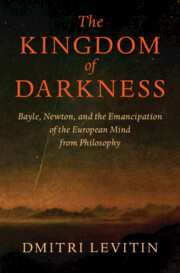Book contents
- The Kingdom of Darkness
- The Kingdom of Darkness
- Copyright page
- Contents
- Preface
- Abbreviations and Conventions
- General Prologue
- Part I Giving Up Philosophy
- I Prolegomena
- I.1 Emancipating Natural Philosophy from Metaphysics
- I.2 Emancipating Theology from Philosophy
- I.3 Reconstructing the Pagan Mind in Seventeenth-Century Europe
- Part II Pierre Bayle and the Emancipation of Religion from Philosophy
- Part III Isaac Newton and the Emancipation of Natural Philosophy from Metaphysics
- Part IV The European System of Knowledge, c.1700 and Beyond
- Bibliography
- Index
I.3 - Reconstructing the Pagan Mind in Seventeenth-Century Europe
A Historico-Philosophical Critique of Pure Reason
from Part I - Giving Up Philosophy
Published online by Cambridge University Press: 23 March 2022
- The Kingdom of Darkness
- The Kingdom of Darkness
- Copyright page
- Contents
- Preface
- Abbreviations and Conventions
- General Prologue
- Part I Giving Up Philosophy
- I Prolegomena
- I.1 Emancipating Natural Philosophy from Metaphysics
- I.2 Emancipating Theology from Philosophy
- I.3 Reconstructing the Pagan Mind in Seventeenth-Century Europe
- Part II Pierre Bayle and the Emancipation of Religion from Philosophy
- Part III Isaac Newton and the Emancipation of Natural Philosophy from Metaphysics
- Part IV The European System of Knowledge, c.1700 and Beyond
- Bibliography
- Index
Summary
In the seventeenth century, European thought about the capacities of a perfectly rational mind (i.e. that of the best pagan philosopher) underwent a major transformation. This transformation had three sources: (i) philological scholarship concerning the history of religion that rejected patristic narratives of pagan/Judaeo-Christian similarity; (ii) reconsiderations of Asian theology as reported by missionaries and travellers; (iii) new approaches to pagan philosophy, which was more and more conceived of as fundamentally incapable of achieving the ‘true’ metaphysical and cosmological worldview held by Christians, above all because of its universal adherence to the rational principle of ex nihilo nihil fit. As a result, by 1700 a consensus emerged that the rational pagan mind bereft of revelation would tend to some kind of animism, pantheism, vitalism, or even monism. The debate was whether this pagan worldview concealed a latent monotheism (a view held by John Selden, G.J. Vossius, Tobias Pfanner, Ralph Cudworth, and others) or to a monistic atheism (a position first articulated by Pierre Gassendi, and then further developed by Jakob Thomasius, Samuel Parker, François Bernier, and many others). By the end of the century, the second view had largely triumphed.
Keywords
- Type
- Chapter
- Information
- The Kingdom of DarknessBayle, Newton, and the Emancipation of the European Mind from Philosophy, pp. 165 - 224Publisher: Cambridge University PressPrint publication year: 2022

